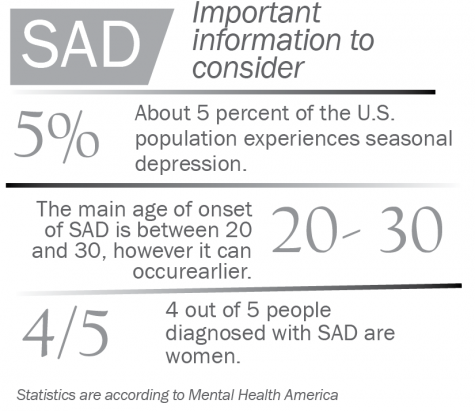Seasonal Depression
A deeper look into the mental disease affecting millions
December 18, 2018
With the changing of seasons fast approaching, shorter days, busy schedules, lack of motivation and gloominess is a major issue for some. This time of year especially takes a toll on many people’s mental health. In America alone, there are an estimated three million cases of diagnosed Seasonal Affective Disorder (SAD). SAD, also referred to as seasonal depression or in a less sensitive term, “ The Winter Blues”, most often displays symptoms in teens and young adults. A sensitive topic for the 10 million who are affected by it, SAD differs from typical clinical depression as it is an annual occurrence. “The difference between this and regular depression is that it usually resolves itself in the [early spring] because the days begin to lengthen,” said North Platte Bridges Counseling, counselor, Heather Rathjen.
Experts cannot pinpoint a definite cause of SAD, but there are studies suggesting several reasons. For example, it is important for those living far from the equator, especially during winter months, to take extra action on protecting their mental health. Humans’ circadian rhythm, or the pattern our bodies use to keep in tune with the rising and falling of the sun, is what keeps sleep on track. As a result of limited sunlight and more time indoors, humans’ biological clock can be easily jumbled.
Increased melatonin levels and decreased serotonin production are also main factors that may contribute to SAD. Melatonin’s main function is to control the sleep process. Contrary to summer months where the sun is out longer, our bodies typically produces more melatonin, causing the heart rate and body temperature to lower, making people sleepier. This occurrence primarily takes a toll on those struggling with SAD, making them feel groggy, unmotivated, and stressed.
The other suggested cause of SAD is low serotonin levels. Serotonin helps regulate anxiety, stress, and mood, meaning not enough of this chemical will disrupt emotional stability. Serotonin is produced initially by digesting food and then becoming its true form inside the intestines and in the brain. A serotonin deficiency means mood swings, a lowered immune system, and is shown to correlate directly with depression.
With Seasonal Affective Disorder, people display typical symptoms of clinical depression. “They may be eating more, crave carbs, withdraw from social activities, be more lethargic, and in rare cases, have suicidal thoughts,” said Rathjen. According to Mental Health America, it’s possible to prevent or lower the effects of SAD. Spending more time outside, exercise, and meditation are all suggested ways to aid in reducing this annual feeling.
Understanding SAD:
Determining if you have Seasonal Affective Disorder can be a challenge. It may be difficult to identify this illness because other mental disorders hold many of the same recurring symptoms. Although SAD is a common occurrence, its effects are different for everyone. This cannot be treated like common illnesses such as influenza or a cold. Something affecting the mental state requires those suffering to persevere and take initiative. If you are experiencing a loss of energy, feelings of worthlessness, and an increase of weight, stress, and unmotivation on a day-to-day basis, it may be time to consult a doctor. Rathjen says that in order to be diagnosed, you need to have had symptoms [of SAD] reoccur for at least two years. However, it’s never too early to talk with someone about how you are feeling.
If you decide you’re ready to see your doctor, they will conduct a depression screening and ask you appropriate questions to identify how you are feeling. Depending on the diagnosis, your doctor may prescribe antidepressants or refer you to see a counselor. As a counselor, Rathjen also recommends cognitive behavior therapy because it “is the premise that [peoples] thoughts can get very negative… then leading to negative behaviors. Those negative behaviors promote depression.” This therapy has been shown to reduce the effects of both depression and SAD.
If you are experiencing symptoms of SAD, it’s important to remember it is not uncommon and that you are not alone. To help yourself with this, learning about what this disease entails is beneficial to not identifying it as a stigma and improve your well being. From behavioral therapy, exercise, socializing, and engaging with others, there are many ways to cope with, and possibly recover from, SAD. Being aware of this and having the courage to reach out if you are struggling is one of the best ways to help improve how you’re feeling.
My personal experience:
As an extremely busy individual, I am constantly running errands for journalism, participating in sports, working as a lifeguard, and managing to squeeze in a social life. With so much occupying my time, I have learned that it’s vital to keep a positive outlook. Knowing that I hold important responsibilities ensures my mind that I will be prepared my college life.
I wouldn’t trade my crazy schedule for anything, as this craziness keeps me motivated, but I do occasionally get overwhelmed and feel very low regarding my apathetic standing. Additionally, with the loss of a loved one during a past holiday season, finals hitting hard, and the daily struggle of getting out of bed each morning, seasonal depression is something I have to encourage myself to look past. I strongly believe that recognizing these traits is crucial to understanding how to react to environments and understand individual feelings.
Understandably, everyone deals with their personal trauma, especially SAD, differently. With my diagnosed depression, I have learned that effective communication is one of the most important and beneficial methods of reducing mental and emotional anxiety that depression can cause. For example, this year especially I feel incredibly blessed to have formed bonds with such supportive people.
During a recent church service I attended, the sermon proclaimed the benefits of rejoicing. As endowed and graced individuals, we have so much to be thankful for. Even with the difficult holiday season learning to be appreciative is one of the best attributes to possess. I may never be able to overcome this annual feeling but I have the security of knowing that I am not alone.



